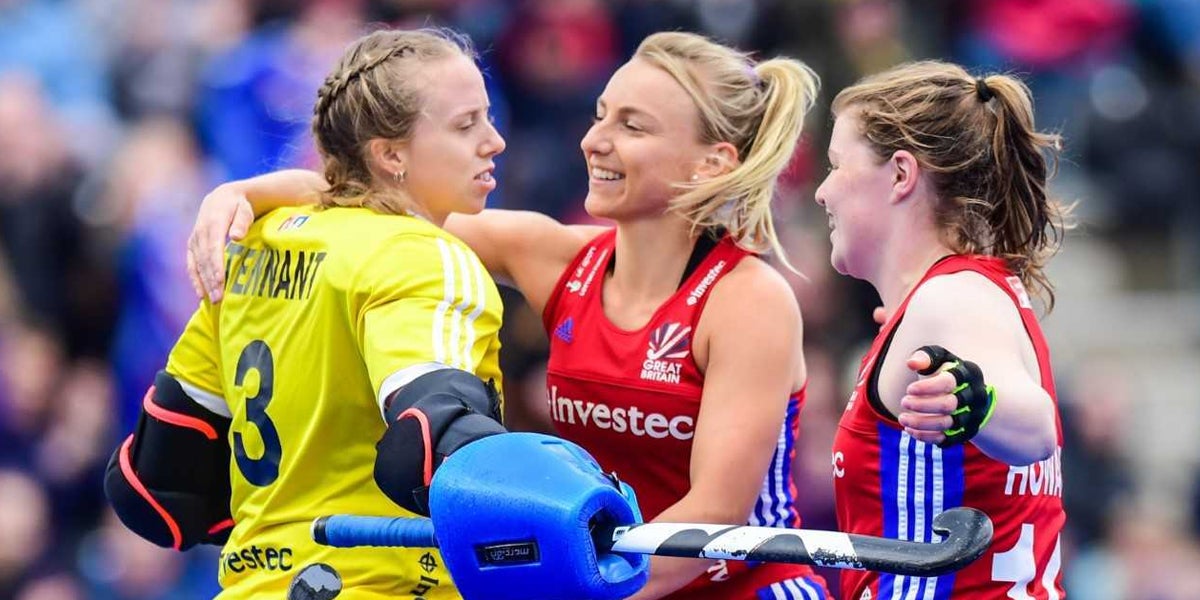- Community
Amy Tennant Shares Her Experiences This Pride Month

I’ll start by saying, that my personal experience of being a Lesbian playing Hockey for my country and club has been an overall positive one. I am wholly and lovingly accepted by staff and teammates and I am lucky to say I have never felt any hate, or bigotry from them. England Hockey’s public support and promotion of the Stonewall Rainbow Laces campaign, showing an acknowledgement of struggles, and the celebration of the LGBTQIA+ community, has added to the contented feeling I have in my skin whilst playing the sport. I am also very proud of the fact the sport I play offers safe spaces for LGBTQIA+ members to play, in the form of London Royals Hockey Club, Remnants Hockey Club, and Oscar Wildes LGBTQIA+ Hockey Club. It would be fantastic to see more clubs in the UK showing their support and harbouring accepting communities, offering more safe spaces to exist within the sport.
However, having this space to reflect, it would be amiss of me not to also acknowledge where things need to be better. I’ll begin with those offensive little comments everyone in the LGBTQIA+ community will have experienced at some point or another. A study conducted by Sport England1 found that the use of homophobic and transphobic language, and the acceptance of it as “banter” was prevalent in sport. Some examples I have experienced, “do you have a boyfriend”, “is that your sister”, “that’s so gay”. These comments have been made by many people from different areas of my life, friends, teammates, club, and hockey family members. In the situations I’ve found myself in, I don’t think they are necessarily being explicitly homophobic, it is more a lack of understanding (of the history of homophobic language) and closed mindedness to the “non-conventional”. Nevertheless, does it sometimes make me feel different, abnormal, sad? Yes.
Whilst I don’t think about my sexuality when I play internationally or feel there are any negative connotations within matches, I am always quietly aware that some countries we play in don’t see heterosexuals and homosexuals as equal culturally, or legally. Sometimes I feel nudged back into the closet to conform to other cultures, there is that little bit of me which knows I am not accepted there.
There is also a long way to go for other members of the LGBTQIA+ community. A strong indicator of how accepting a sport is to members of the community is how many participants are openly ‘out’ about their sexuality. Gay men, in Hockey, and sport in general, are underrepresented and a relatively small proportion are ‘out’. Studies have shown that whilst there is often acceptance from colleagues2, the media and fans are where homophobia is common. The media plays into the rhetoric of the conventional “male” and the socially supported attitudes, behaviours, and values which are considered ideal for males. Bravery, strength, competitiveness, independence. There is a core of heterosexuality and hypermasculinity within sport, of which the media plays a big role in maintaining. This has to change.
I think back to when I was younger and played in some friendly summer hockey tournaments against a team which included a Trans Female, and would hear many oppositions complaining, making comments about the fairness of it, of how much harder she could hit the ball, aerial the ball, and so on. This is echoed in the UK Sport Study3 which found additional difficulties (when compare to Gay & Lesbian individuals) for Transgender people to participate in all levels from grassroots, to performance sport. Transgender individuals are restricted from playing in National Age Group Squads in Hockey, which aligns with the criteria set out by FIH. What is promising is that England Hockey’s policy states that Transgender individuals are permitted to participate fully in their affirmed gender (this includes training, playing in informal matches, or playing in hockey competitions). From my experience, it seems we still have some way to go in welcoming them openly into our sport from a cultural perspective. Sport should be for all people, at all levels and currently it isn’t.
Fink et al (2012) & Gough (2007)5 conducted studies showing that having just one supportive person in the sport setting (e.g. coach, admin, teammate) increased athletes’ comfort in coming out to teammates. I encourage you to be that one person. Be kind, willing to learn, and keep an open mind. Don’t get dragged into the rhetoric the media feeds into. As an LGBTQIA+ individual, and as an LGBTQIA+ ally, if you can, challenge people when they make you, or your LGBTQIA+ associates uncomfortable.
Lastly, Pride Sports is a fantastic organisation who challenge homophobia, transphobia and biphobia in sport. They provide information for LGBTQIA+ individuals looking to play sport, and for sports looking to be more LGBTQIA+ inclusive.
https://pridesports.org.uk
By Amy Tennant - England and Great Britain Hockey Goal Keeper
References
- https://sportengland-production-files.s3.eu-west-2.amazonaws.com/s3fs-public/pride-sport-sport-physical-activity-and-lgbt-report-2016.pdf?HWrXN2KhPLBV8mmOIEqCEh7E1FFOxZKM
- https://www.tandfonline.com/doi/abs/10.1080/1461670X.2019.1639537
- https://sportengland-production-files.s3.eu-west-2.amazonaws.com/s3fs-public/pride-sport-sport-physical-activity-and-lgbt-report-2016.pdf?HWrXN2KhPLBV8mmOIEqCEh7E1FFOxZKM
- ‘Trans or transgender hockey players – Transgender Guidance for Local Organisations (July 2017)’: England Hockey
- Krane, V. Inclusion to Exclusion: Sport for LGBT athletes. In: Routledge International Handbook of Sport Psychology. 1st ed. Oxon: Routledge; 2016.

